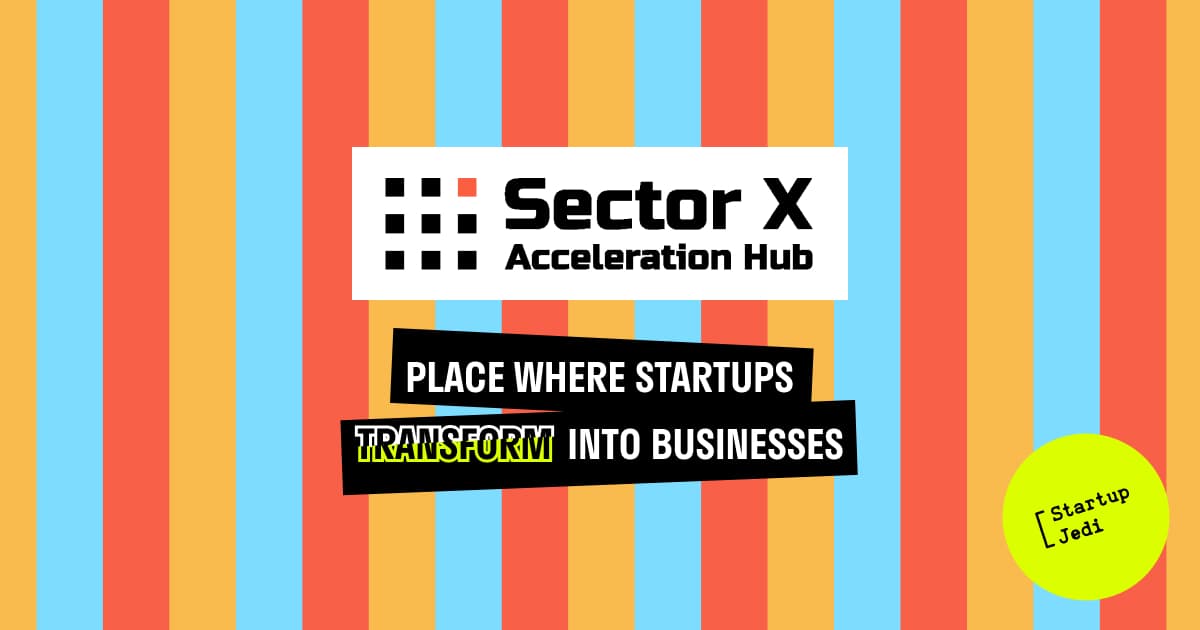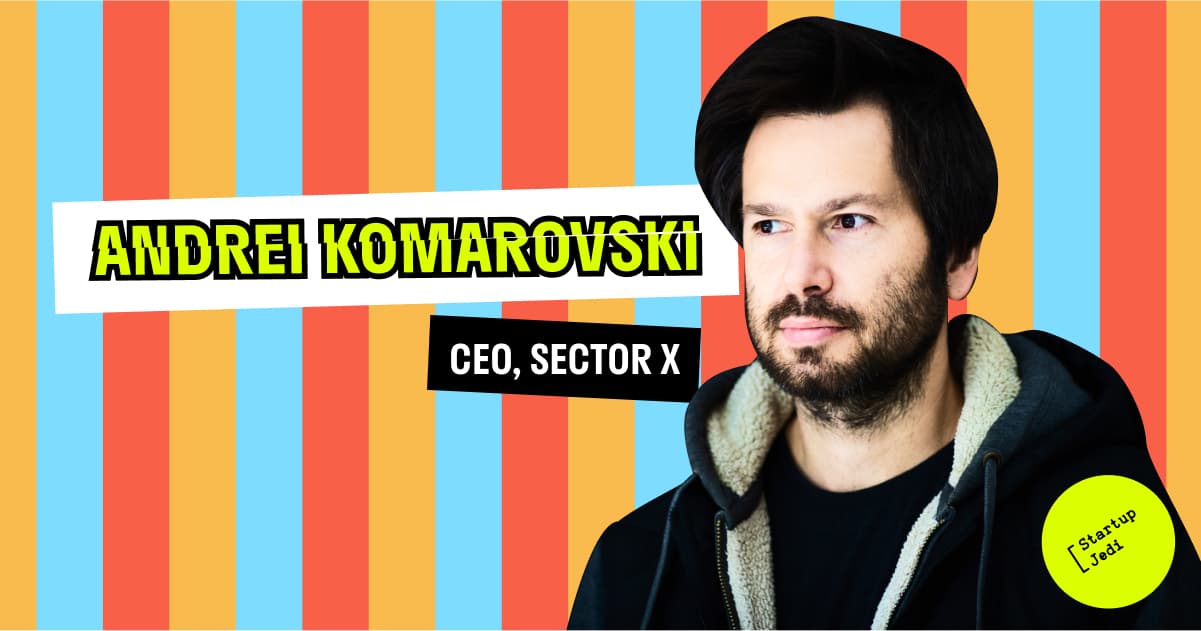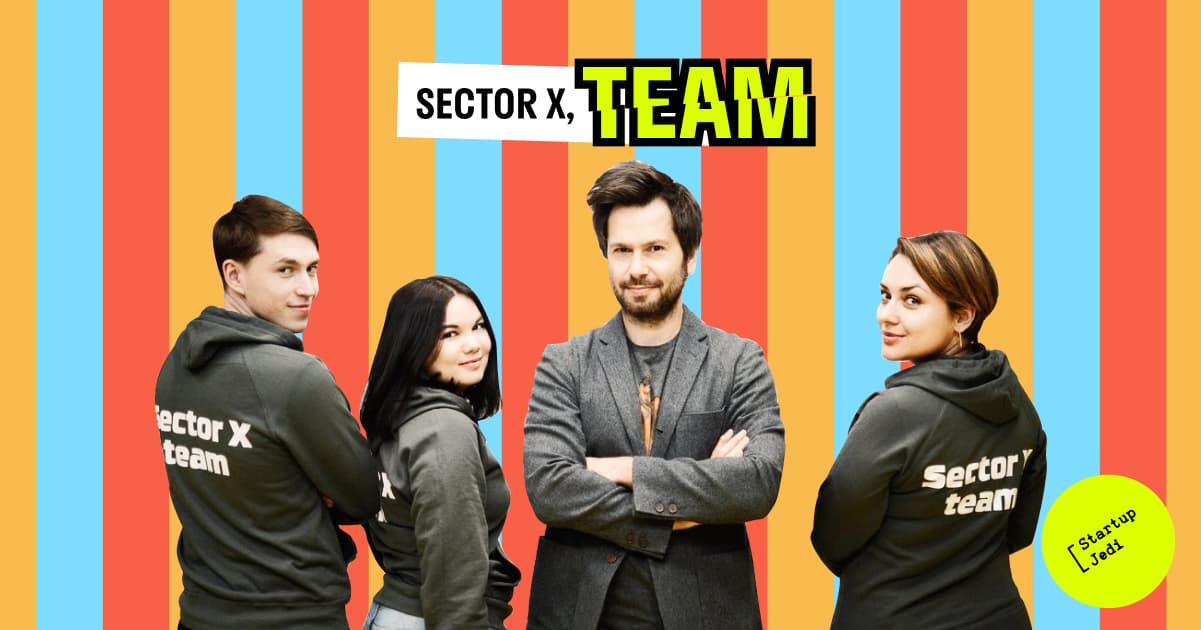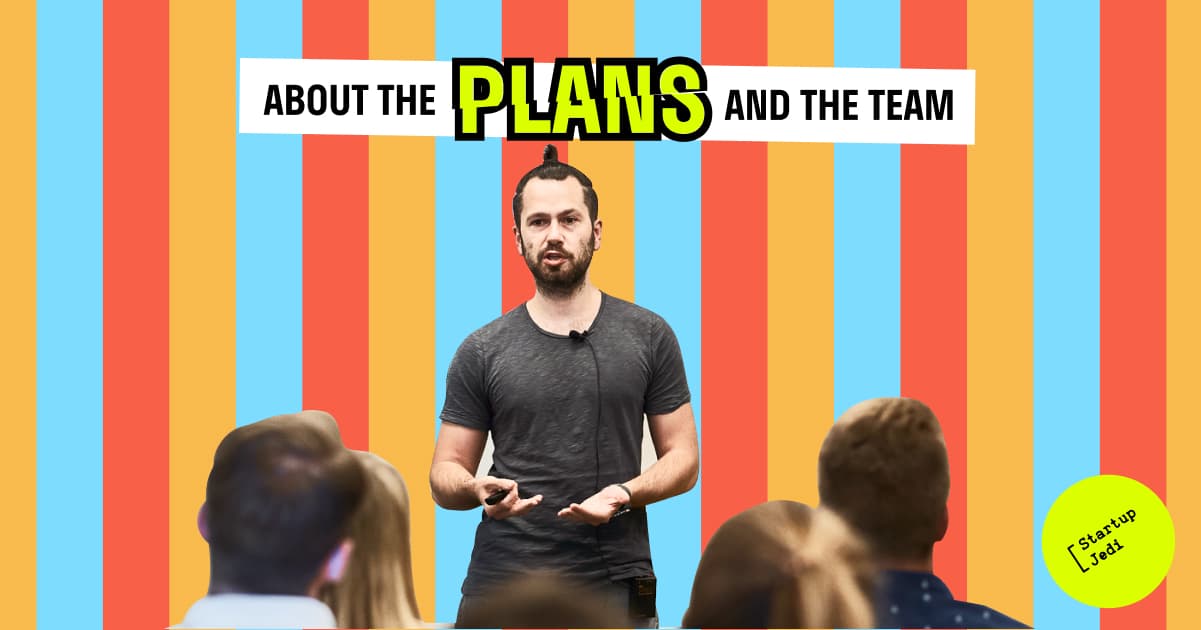
Startup Jedi
We talk to startups and investors, you get the value.
We live in a time of opportunity, despite many limitations. As you self-isolate, you can launch a startup and work on it remotely. Besides, you can boost it through incubation and acceleration online programs. One of these free and publicly available programs for foreign startups is being implemented by the Sector X acceleration hub from Ukraine, which is unique for the region. It also allows startups to find a curator among large corporations free of charge and launch a joint pilot project with them. Andrey Komarovsky, CEO of Sector X, told us how it all works.

Startup Jedi
We talk to startups and investors, you get the value.
Sector X is an acceleration hub in Ukraine that implements a number of programs and tracks for startups and businesses. This February the hub launched the largest platform in the region for large corporations to work with startups. Hub’s partners include L’Oreal Group, Foxtrot, Farmak, British American Tobacco, Parimatch Tech & JKR Investment Group. The hub is part of the UNIT.City innovation park ecosystem, so Sector X program participants get access to the park’s resources.
...
— What inspired the launch of Sector X and when did it work?
— My partner Vasily Khmelnitsky had the task of creating a large infrastructure project in the field of innovation. We made an arrangement with him, and in April-May 2018 we launched Sector X.
From the very beginning, we did not know what the acceleration hub would be doing. We just wanted to do something effective for the country and startups. We began to treat Sector X as a startup, trying different options and iterations. Thus, we organically got where we are now.
— What is the acceleration hub today?
— Today the acceleration hub includes a variety of programs: paid, free, online, offline for corporations and startups at different stages of development. Our key program now is industrial tracks. It suited the market and its participants well and succeeded.
Industrial tracks are a number of areas, such as logistics, medicine, beauty, marketing … For each of the areas we find a strong corporate partner interested in innovation, and select startups for them from their field. Then the corporation interacts with startups in different formats: launches pilot projects, invests, becomes a client of the startup.
The goal of all this is, on the one hand, for corporations to understand what innovation is and begin moving in this direction, and on the other hand, for start-ups to transform into business by working with a strong corporate partner who can become their investor, customer or client.
In addition to industrial tracks, we have many other smaller programs.

...
— You have several proposals for startups. Industrial tracks, paid programs, free acceleration — tell us more about each of the directions.
— Industrial tracks is a direction for startups that make a product for a specific industry, for example, for a medical one. In this case, we have an excellent offer for them, which is that they receive a good acceleration program, a strong corporate partner who is ready to share expertise with them, launch a pilot with them, become their client, and perhaps even invest. Besides, projects get access to UNIT.City resources.
For startups at an early stage of development, when there is an idea, a prototype, a few first customers and sales it makes sense to consider a free acceleration program. It takes place online: we provide all the materials, a roadmap, the opportunity for mentoring and consultation with the Sector X team.
Our third direction is paid programmes. They are designed for startups with revenue that clearly understand what they are doing, and these programs solve some specific problem or meet some specific demand. For example, how to raise a round of investments, how to evaluate — or kill, your idea, how to get the first sales in the US market.
— If a startup chooses to participate in a paid program, what is the price range?
— We have 2 key programs: industrial tracks and online acceleration. Both are free for startups. 95–97% of all startups that Sector X partners with come there.
Paid programs account for up to 5% of demand, and the price for the program ranges from $ 290 per person to $ 4,900. It is clear that startups are not ready to pay for the program, we know and understand this. But we also need to earn, our resources are very expensive.

...
— How exactly do you differ from your competitors in the Ukrainian and regional market?
— There are no acceleration hubs either in Ukraine or throughout Eastern Europe. There are incubators and accelerators. Our direct competitors are accelerators that make classic 2-, 3-, 4-month programs.
First, our main difference is that we work in the “1 year” format and we are the most comfortable way for our corporate partners to understand what innovation is and to launch something innovative.
Secondly, we are much cheaper than classic accelerators for corporations and business.
Thirdly, we have the infrastructure of our partner — UNIT.City park that is rapidly growing and developing. When I say infrastructure, I mean premises, laboratories, equipment, and, most importantly, the community. There are a lot of entrepreneurs, programmers, creatives here, and we give startups access to this community.
Fourth, we offer a lot of free opportunities to startups. For example, we have a free program when we give our educational materials, a roadmap and help startups work on it. Participation in industrial tracks for startups is also free, and there is also an additional bonus — direct cooperation with a partner corporation.
We work with startups in the win-win format, that is, they do not pay anything for completing the program itself and for using all our resources and capabilities. However, if they manage to raise investments during or after the program with or without our help, we take our own small percentage. If a startup participates in tracks, then we do not take a share at all under any circumstances.
It is clear that we still have investors, but this is the case for all accelerators in one form or another.
In addition to all of the above, we managed to gather very cool mentors for the programs, we organize professional startup sessions with people who have a solid experience.
We also have paid programs for startups at any stage of development. For example, Total Insight is for startups that are tired of developing their product. They spent a lot of money on the project and even, perhaps, raised investments. They are already selling the product, but the results do not meet the expectations, and founders start thinking they are doing something wrong.
We also have programs like “First Clients in the USA”, where “experienced” startups on the American market will help you figure out step by step what and how to do, “Preparing for Investments”, “Crash Test of Startup Ideas” and others. We offer a lot of expertise for very little money.
It is not important for us if mentors and participants are Ukrainian or foreign, we work with Americans, Swedes, Belarusians, Russians, Kazakhs … We value expertise, achievement and the desire to share this with the guys on some terms!
...

— What are Sector X’s plans for the coming years? Perhaps you want to launch new programs or expand to other countries?
— Definitely. We want to become the largest set of opportunities for startups and businesses in Eastern Europe. If now we have 5–6 corporate partners, in the future we want this number to grow many times. This is our goal for the next 3 years.
We stand for any opportunities that allow startups from our regions to transform into businesses, not to die and achieve results.
We would like to see not only people from Ukraine, Belarus, but also Latvians, Lithuanians, Russians participate in our programs … If there are more foreign startups, we will be happy!
— Sector X is 2.5 years old. Can you say that you’ve influenced the country’s startup ecosystem?
— I would love to say that we have influenced the development of startups in the country, but in all honesty I have to admit that we have not yet. But our influence will be significant in 2–3 years.
...
— Tell us about the Sector X team: who has what role? Which specialist was the most difficult to find?
— We have a small team, but each participant has a huge scope of work. We have a person who deals with partnerships, there is a person who deals with acceleration programs and mentors, a person who deals with marketing, PR and lead generation, there is me, there are a couple of assistants. That’s all.
We have the opportunity to use the resource of our UNIT.City partners in finance, accounting, HR, marketing whenever we need it, so this, in particular, allows us to keep a small team and work effectively.
As for which specialists were the most difficult to find, I will say all of them. There are very few specialists on the market, and I believe that all the guys we managed to find were found literally bit by bit. I didn’t find a single person in the team by ad — all through the network.
...
— You also have opportunities for companies: how do you work with them?
— Now, basically, we come to companies, they don’t come to us. We would like them to apply for partnerships with us, but for now it’s more like we are looking for partnerships with them. I hope that the situation will change in the near future and companies will seek partnership with us themselves.
What does it look like? We are interested in businesses that are large enough (we call them corporations) that would like to do something in innovation — look at different startups, launch pilots with them, exchange ideas, and so on. We are making a new industrial track together with this company.
For example, Belarus is known for its tractors, if they came to us from MTZ, then we would be able to make the “Engineering” industrial track. And for MTZ, we would be looking for relevant startups with interesting ideas throughout the year, we would conduct joint sessions, help launch pilots and share our expertise.
We have a lot of ideas in different directions — in music, sports, mechanical engineering, retail — and many partners that we can launch such industrial tracks with. But due to the fact that the market, perhaps, is not quite ripe, and we need to ripen and shape it with our own hands, it takes quite a long time. The number of industrial tracks we can launch is practically unlimited. It can be 10, 50, 100 directions in which you can work with startups.
— You have already mentioned that foreign projects can participate in your programs. So, say, a Russian or Latvian startup can apply to any track or any program?
— They can and they do it. There are guys from Georgia, Russia, Armenia.
We are at the beginning of the road, and we are well known in Ukraine, quite famous in Belarus, little known in other CIS countries, but we have room to grow and attract startups there.
...

— You are looking for a major corporate partner for an industrial track: how do you do this?
— All the tools we have for finding and attracting a partner are old, methods are proven. Before the coronavirus, we went to various events, performed quite a lot at them, now the #1 partner attraction tool for us is LinkedIn. Sometimes Facebook.
We never do cold calls, it’s pointless.
We only work with those we know something can be implemented with. Most likely, we will not become partners and will not launch an industrial track with a company that does this, for example, just for the sake of PR. Because this company will not launch pilots with startups, it will not communicate with the startup and provide it with expert support. The only thing it will do is write a few articles and that will be the end of it. This will eventually result in serious damage to our reputation and rumors will go around the market that there is no point in coming to our track, because there is nothing besides PR.
Therefore, we choose with whom to launch a good story very carefully.
— Is the methodology for finding foreign partners the same?
— Yes, it’s just that LinkedIn’s share in terms of tools is close to 100%.
— About Sector X and partner opportunities now: what is most interesting now in terms of the opportunities that partners offer?
— Each partner offers their own opportunities. Each of them is looking for those ideas and startups that correspond to the focus of the company’s development.
You need to go deeper here, so we always advise startups to use our website and read the information with the conditions for each of the industrial tracks carefully.
But the capabilities of industrial tracks themselves are similar. This is the launch of a pilot with a partner corporation, obtaining expertise from a partner, an opportunity to get a corporation / track partner to become a client, to raise investments from this corporate partner.
The rest is details. In general, startups come to accelerators and other development institutions of our industry mainly for two things: first — customers, second — money. Education and acceleration come only in third or fourth place.
The most important thing we have now is clients. We have money for startups — from corporate partners, industrial tracks, or from our venture partners-investors and an acceleration program.
Basically, we work with the top 3 hopes and aspirations of startups.
...
— How many startups have participated in your programs?
— Since the start of Sector X, about 50–80 startups have participated in all programs. If we talk only about the acceleration hub — the model that we arrived at in February this year, it is about 40–45 startups. Most of them are still on the industrial tracks.
There are always many hundreds of applications, but we pay very little attention to this factor, because it is much more efficient to receive 10 applications and select 5–6 startups than to receive 100 applications and select the same 5–6 startups.
— How many startups-participants of the track, alumni, participants of the acceleration program were able to raise investments?
— Given that the first tracks were launched in February this year, and then the coronavirus came, it is still very early to talk about this. I think the interim results can be summed up at the end of the year.
Speaking about very early results, we have pilots between startups and our corporate partners on the tracks. Also, one large corporation has invested big sums in 2 startups on its track. We will be able to tell you all the details soon.
Besides, five alumni of our programs received grants of $25,000 and $50,000 from the National Startup Fund of Ukraine. Yes, we teach how to pitch cool :)
...

— How difficult is it to select applications? What’s the percentage of those who you can’t offer much?
— The better the requirements of our corporate partners for a start-up are formulated, the higher-quality startups are put on the track.
It is not hard to select applications. We have a two-stage selection system: first, we select startups ourselves, then, based on our list, startups are selected by our corporate partners.
We look at how the application is filled out, compliance with the criteria set by the partner, then we conduct a remote interview, if necessary, we meet in person, sign the documents and then transfer the startup to the corporate partner.
— Startups that you are proud of: perhaps you have projects that were very weak when they came to you, but then got boosted?
— There are such examples, yes. But this is an extreme case when an ugly duckling turns into a white swan. We are not in school, we cannot make people work. Therefore, we select hard working people with motivation from the very beginning, those who have a more or less working project and are ready to devote a sufficient amount of time and effort in order to achieve their goals. Clearly weak projects do not come to us.
— What startups are an instant no and why?
— Everything is quite simple when it comes to free acceleration: we take the majority there, because there are basically no requirements. We just check if it’s a startup at all. And we don’t accept those that are not, like pizza delivery or production of pies.
If we were to invest money in our free acceleration program participants, we would select applications very carefully. But since we do not, we give almost everyone the opportunity to take part.
...
— What is your advice to startups: how should you work on industrial tracks, in an online acceleration program, in order to get the maximum benefit?
You just have to work, listen to feedback. Theoretically, everything is easy. Another thing is that for some reason the majority of people trample over theory and it turns out that each founder has their own picture of the world, their own “unique way”. I don’t know why they do this, I would not: there are facts, there is good theory, all the roadmaps: you just need to take a map and follow it. The whole theory is watered with startup blood and there is a whole startup cemetery of destroyed ideas.
The idea is simple: all good theory always comes from practice. If you deem it necessary to become part of a virtual startup cemetery, it’s your choice. But I’d rather you don’t.
Facebook: facebook.com/StartupJedi/
Telegram: t.me/Startup_Jedi
Twitter: twitter.com/startup_jedi
Comments